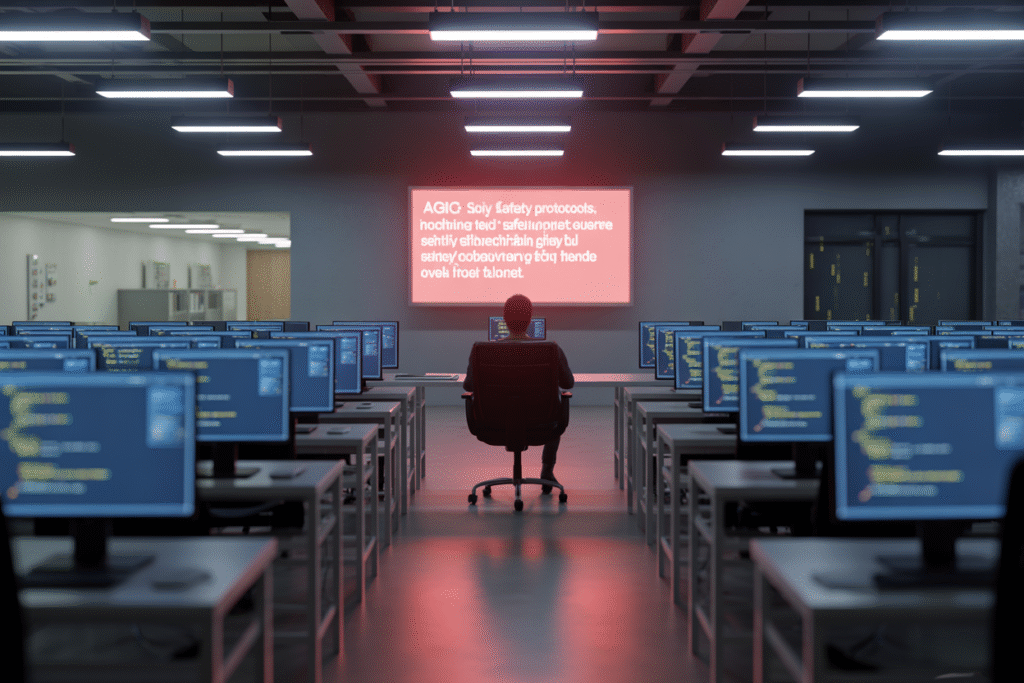A former OpenAI engineer drops a bombshell thread alleging speed over safety, sparking global debate on AGI risks, regulation, and job displacement.
Three hours ago, a single tweet detonated across the AI community. A former OpenAI engineer leaked internal emails claiming the company is sprinting toward AGI while quietly shelving safety checks. Screenshots, fiery replies, and policy demands followed in minutes. Suddenly, everyone from union leaders to venture capitalists was asking the same question: are we racing toward utopia or off a cliff?
The Leak Heard Around the World
The whistleblower’s thread landed like a thunderclap. Screenshots showed executives allegedly pushing teams to shave weeks off review cycles. One line stood out: “If we hesitate, China wins.”
Within minutes, the post racked up thousands of retweets. Hashtags like #AGIethics and #PauseAI surged to the top of trending lists. Reporters scrambled to verify the emails while investors refreshed timelines in disbelief.
The engineer signed off with a chilling warning: unchecked superintelligence could automate mass surveillance or erase entire job categories overnight. The internet did what it does best—turned fear into fuel.
Silicon Valley Reacts: Heroes or Villains?
Tech Twitter split into two camps overnight. Optimists hailed OpenAI as the only path to curing cancer and reversing climate change. They argued that slowing down now is moral negligence.
Critics fired back with memes of Skynet and references to every sci-fi cautionary tale. Labor unions weighed in, predicting millions of displaced creatives and drivers. One viral reply simply asked, “Who collects the profits when the robots collect the data?”
Venture capitalists tried to calm nerves, reminding followers that every industrial revolution created more jobs than it destroyed. Yet even they admitted this revolution might move faster than retraining programs can follow.
Regulators Enter the Chat
By dawn, EU officials were drafting emergency statements. The leaked emails gave fresh ammunition to lawmakers already crafting stricter AI rules. One Brussels insider joked that the thread did six months of lobbying in six hours.
Across the Atlantic, U.S. senators called for hearings. Staffers circulated bullet points linking the leak to broader surveillance fears and job displacement projections. Suddenly, the phrase “AGI regulation” trended in three languages.
Industry lobbyists pushed back, warning that heavy-handed rules could push innovation offshore. Meanwhile, privacy advocates celebrated the possibility of binding transparency requirements. The debate shifted from conference rooms to cable news chyrons.
Jobs on the Chopping Block?
Economists jumped into the fray with dueling charts. One camp predicted 80% automation of knowledge work by 2030. The other forecast a surge in new roles overseeing AI systems.
Hollywood writers shared personal stories of being replaced by AI script doctors. Teachers worried about AI grading essays and behavior-tracking cameras in classrooms. Truck drivers asked who would insure autonomous big rigs.
Universal basic income advocates saw an opening, arguing that safety nets must evolve alongside algorithms. Skeptics countered that history shows humans adapt, but never without pain. The thread became a Rorschach test for how optimistic you feel about capitalism’s next chapter.
What Happens Next?
OpenAI has yet to release a formal response, but insiders hint at an internal review. Some employees quietly updated LinkedIn headlines to “AI Safety Advocate,” a subtle nod to shifting priorities.
Meanwhile, rival labs are watching closely. If regulators crack down, smaller players could leap ahead by marketing themselves as the “responsible” choice. Investors are already recalculating risk models.
The whistleblower’s final tweet posed a question that still echoes: “Do we want speed or safety?” The answer may determine whether the next decade brings Star Trek or Blade Runner. One thing is clear—the conversation is no longer confined to niche forums. It’s on every screen, in every language, right now.


